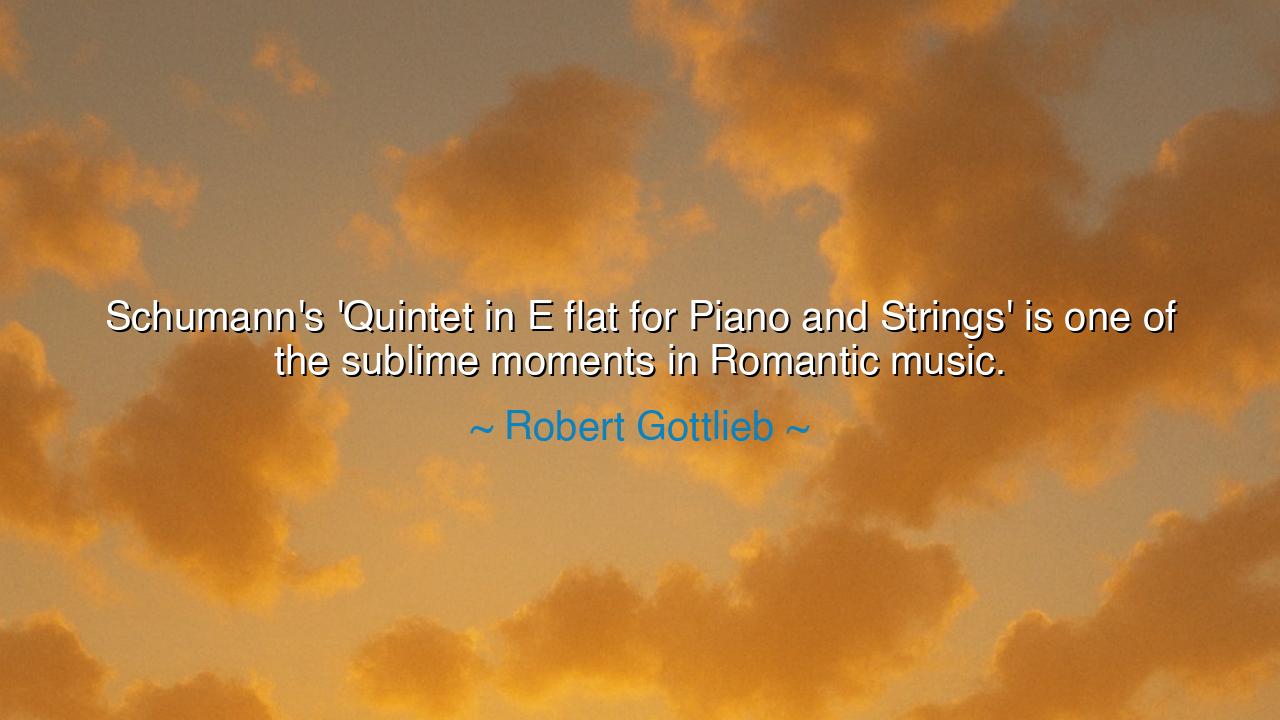
Schumann's 'Quintet in E flat for Piano and Strings' is one of
Schumann's 'Quintet in E flat for Piano and Strings' is one of the sublime moments in Romantic music.






The words of Robert Gottlieb—“Schumann’s ‘Quintet in E flat for Piano and Strings’ is one of the sublime moments in Romantic music”—are not merely an observation of taste, but a hymn to the heights of human creativity. They remind us that within the realm of art there are certain creations that pierce beyond the ordinary, carrying us into the realm of the sublime, where spirit and sound become indistinguishable. In this recognition, Gottlieb speaks not only of music, but of those rare moments when humanity seems to brush against eternity itself.
The origin of this truth lies in the Romantic era itself, that wondrous age when composers, poets, and painters sought not only to represent life but to transcend it. Robert Schumann, both fragile and fierce in his genius, poured into his Quintet the essence of longing, triumph, and tenderness. To call it “sublime” is to acknowledge that it rises above the merely beautiful, for beauty pleases the senses, but the sublime shakes the soul. It is the thunder over the mountains, the ocean’s endless roar, the harmony that reminds us that we, too, belong to something greater than ourselves.
Consider the tale of Beethoven’s Ninth Symphony, performed for the first time when the composer himself was deaf, unable to hear the very majesty he created. When the audience erupted in thunderous applause, Beethoven could not perceive it until someone turned him around to see. That moment, like Schumann’s Quintet, was sublime: a triumph not of sound alone but of human will and divine inspiration interwoven. Such stories reveal why Gottlieb exalts Schumann’s work—for in its chords and melodies we sense the eternal struggle and the eternal hope of the human condition.
The Quintet in E flat stands as a monument to collaboration: the piano and strings entwined, each voice distinct yet united, echoing the truth that greatness is not solitary but communal. Just as Schumann himself was supported, inspired, and challenged by Clara, his beloved wife and a virtuoso pianist, so too the music reminds us that the highest creations are born of partnership and harmony. The sublime is never isolated; it is the convergence of many forces, drawn together by vision.
What lesson, then, can we take from this exaltation of Romantic music? It is this: in life, seek the sublime. Do not settle only for the pleasant or the convenient, but strive for those moments that awaken awe. Just as Schumann’s Quintet lifts the listener beyond the mundane, so too must we shape our days not only with routine but with acts of courage, depth, and creativity. To live without seeking the sublime is to walk the earth while ignoring the sky.
Practically, how may this be done? Make space for art and silence. Listen, not casually, but attentively, to music that challenges and uplifts you. Read words that stir your spirit. Walk among mountains, or sit beneath a starry sky, allowing the immensity of creation to humble and exalt you. And when you create—whether it be a piece of music, a meal, or a gesture of love—infuse it with sincerity, so that it carries something eternal within it. In doing so, you align yourself with the same spirit that breathed life into Schumann’s masterpiece.
Thus, Gottlieb’s praise becomes more than commentary; it becomes instruction. Schumann’s Quintet is not just music to be heard—it is a reminder of what is possible when the human soul dares to yearn, dares to feel, dares to ascend. May future generations remember this truth: the sublime is always near, waiting in the notes of a song, the brushstroke of a painting, or the quiet moment of awe. Seek it, honor it, and let it transform you.
For in the end, to live fully is to live in search of the sublime—to hear in Schumann’s music not only the strains of Romantic art, but the eternal echo of the human spirit rising toward the divine.






AAdministratorAdministrator
Welcome, honored guests. Please leave a comment, we will respond soon